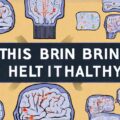Introduction
In recent years, the link between physical activity and brain health has garnered significant attention. Movement, whether through exercise or daily activities, plays a crucial role in maintaining cognitive function and overall mental well-being. This article explores the surprising connection between movement and brain health and provides insights into how you can incorporate beneficial practices into your daily routine.
The Science Behind Movement and Brain Health
Research has shown that physical activity stimulates the production of brain-derived neurotrophic factor (BDNF), a protein that supports the survival of existing neurons and encourages the growth of new ones. BDNF is essential for long-term memory, learning, and overall cognitive function. Regular movement also increases blood flow to the brain, delivering oxygen and nutrients that enhance brain performance.
Types of Movement Beneficial for Brain Health
Not all forms of movement are created equal when it comes to brain health. Here are some types of physical activities that have been shown to boost cognitive function:
- Aerobic Exercise: Activities like running, swimming, and cycling increase heart rate and blood flow, which are beneficial for brain health.
- Strength Training: Lifting weights and resistance exercises improve muscle mass and have been linked to better brain function.
- Yoga and Tai Chi: These activities combine physical movement with mindfulness, reducing stress and improving cognitive function.
- Dance: Learning new dance routines stimulates brain areas involved in memory and coordination.
Mental Health Benefits of Physical Activity
Beyond cognitive function, movement has a profound impact on mental health. Regular physical activity can help reduce symptoms of depression and anxiety, improve mood, and enhance overall emotional well-being. Exercise triggers the release of endorphins, the body’s natural mood lifters, and can help manage stress levels effectively.
Incorporating Movement into Your Daily Routine
Incorporating movement into your daily routine doesn’t have to be challenging. Here are some practical tips to get you started:
- Set Realistic Goals: Start with small, achievable goals and gradually increase the intensity and duration of your activities.
- Find Activities You Enjoy: Engage in physical activities that you find enjoyable to stay motivated.
- Use Technology: Utilize fitness apps and wearable devices to track your progress and stay accountable.
- Be Consistent: Regularity is key. Aim for at least 150 minutes of moderate-intensity exercise each week.
- Include Variety: Mix different types of exercises to keep things interesting and work various muscle groups.
FAQ
1. How does exercise improve cognitive function?
Exercise increases blood flow to the brain, promotes the production of BDNF, and enhances neuroplasticity, all of which contribute to better cognitive function.
2. Can physical activity help with mental health conditions like depression and anxiety?
Yes, regular physical activity can reduce symptoms of depression and anxiety by releasing endorphins and lowering stress levels.
3. How much exercise is recommended for optimal brain health?
The World Health Organization recommends at least 150 minutes of moderate-intensity aerobic activity or 75 minutes of vigorous-intensity activity per week, along with muscle-strengthening activities on two or more days a week.
4. Are there specific exercises that are best for brain health?
Aerobic exercises, strength training, yoga, tai chi, and dancing have all been shown to benefit brain health.
5. Can movement help with age-related cognitive decline?
Yes, regular physical activity can help slow down age-related cognitive decline by maintaining brain plasticity and promoting neurogenesis.
Conclusion
The connection between movement and brain health is undeniable. Incorporating regular physical activity into your lifestyle can provide significant cognitive and mental health benefits. Whether through aerobic exercises, strength training, or mindful movements like yoga and tai chi, taking steps to stay active is essential for maintaining a healthy brain and overall well-being.









